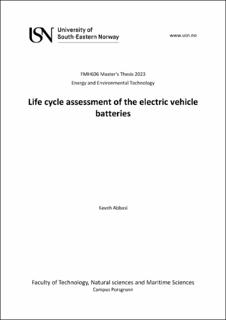Life cycle assessment of the electric vehicle batteries
Master thesis
Permanent lenke
https://hdl.handle.net/11250/3077226Utgivelsesdato
2023Metadata
Vis full innførselSamlinger
Sammendrag
There is a global effort to reduce emissions by electrification and Li-ion batteries and their application in transportation is one of the key elements of this effort. Life Cycle Assessment (LCA) is an approved tool to investigate emissions arising from products, their application, and disposal. There are a lot of ongoing efforts to decrease the emission in the production phase of Vehicle batteries by changing the materials supply chain. In this study, LCA is applied to investigate the effect of applying Nordic materials and energy sources in battery production, on the environmental impacts of the production phase of vehicle battery life cycle. In this way, it has been tried to modify the required processes, energy, and infrastructures to create an LCA model for manufacturing of electric vehicle batteries applying Nordic materials in the Nordic area.
An assessment of battery production using Nordic materials is available through a detailed inventory list and modification of Ecoinvent database. Besides a base model, this model can be applied to consider the effect of changing the materials supply chain on the environmental impacts of electric vehicle battery production. The results show 50% equal Co2 emission in the production of batteries in Norway in comparison with the base model.
Furthermore, Nordic battery production represents reduction in equal phosphorous emission, equal sulfur dioxide emission, and particulate matter emission. Employing Norwegian electricity I production considered as a key element in reduction in emission. Furthermore, Aluminium, NMC materials, and copper production play key role in total emission of battery production, and modifying corresponding production process or recycling them for production process can cause further reduction in Li-ion battery’s emission.
